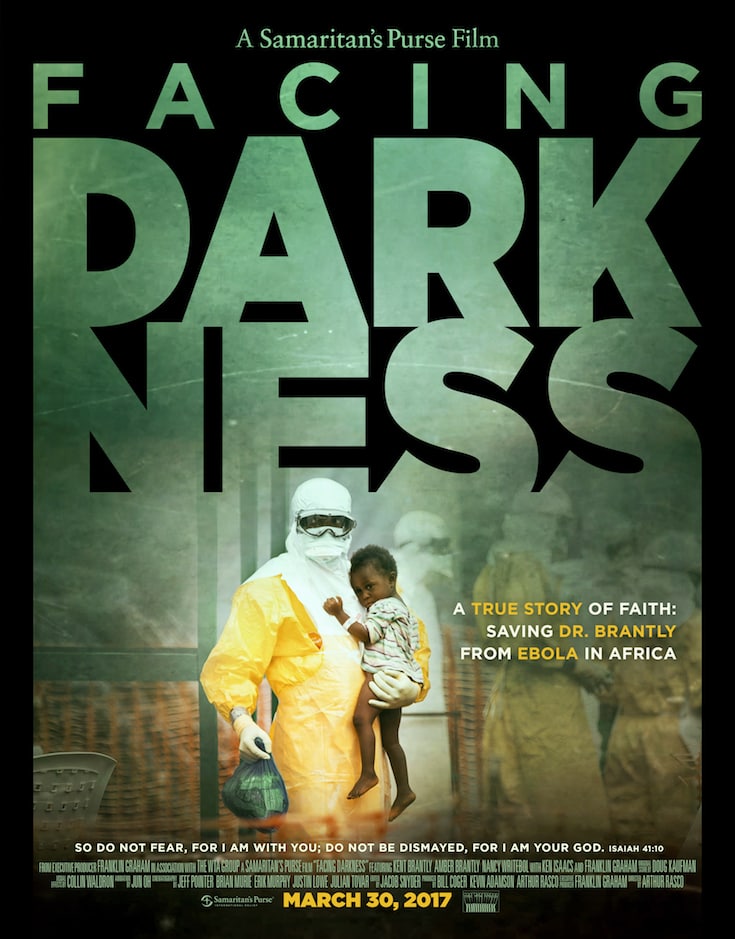Generally, I’m open to all types of entertainment: movies, theater, television. All I want is quality writing, compelling acting, good cinematography, and something that will hold my attention. If that entertainment can help me learn something in the process or make me think, that’s even better.
For that reason, I’ve been especially drawn to documentaries lately and there are plenty to be found. But the more I watch, the more I realize that all documentary films are not created equal. It’s why I love it all the more when I find something that I think everyone should see.
Facing Darkness is a documentary that I was immediately drawn to and yet I had drawbacks about watching this film. Here’s why.
From Samaritan’s Purse, Fathom Events and Executive Producer Franklin Graham, Facing Darkness is the story of the Samaritan’s Purse team that led the efforts to combat the outbreak of Ebola virus in Liberia in 2015. As you may remember, this became a major news story as two of the organization’s team members, Dr. Kent Brantly and Nancy Writebol, contracted Ebola and were eventually flown back to the United States for treatment, and ultimately, recovery.
When I first read The Hot Zone: The Terrifying True Story of the Ebola Virus by Richard Preston (affiliate link) years ago, I was immediately captivated and terrified of what it all meant. Suddenly I knew more than I ever wanted to know about a living, breathing virus that could essentially wipe the human race off of the face of the earth. With only a 10% survival rate in those that contracted the virus, a quick plane ride with an infected person could quickly lead to a major pandemic.
In fact, if you’ve never read the book and like to be terrified by true stories, reading The Hot Zone will make you realize how vulnerable we all are at any given time and how those vulnerabilities were put to the test in a tiny business park in Northern Virginia.
Luckily, we’ve never had to deal with Ebola on U.S. soil – until, of course, we brought Kent and Nancy to the United States from Liberia.
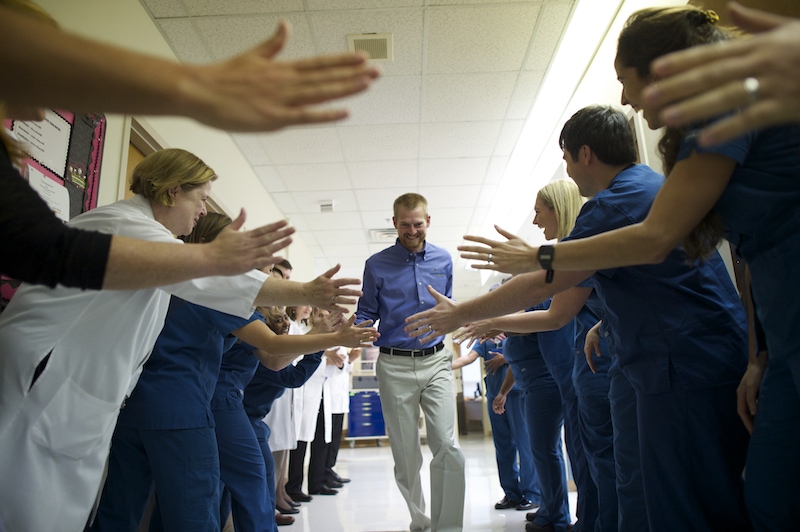
Airlifted from Liberia to Atlanta’s Emory Hospital, Dr. Kent Brantley recovers from Ebola. From Samaritan’s Purse, FACING DARKNESS releases March 30, 2017. (Photo credit: Samaritan’s Purse)
I remember following the news so closely and riding a roller coaster of emotions.
Dr. Brantly was infected. Oh my God, no!
Dr. Brantly’s condition was worsening. He’s going to die!
Dr. Brantly was being transported to the United States. No! He’s bringing Ebola to the United States! This could be the end!
Literally, I was panicked that this was the beginning of the end. But then a miracle happened. Dr. Brantly got better.
I felt conflicted at the time. I was thankful that he was getting aid and assistance. I was hopeful for his wife and children that he would live. I was scared of the potential risk to Americans. And I wondered how fair it was that a white doctor in Africa had the ability to receive top medical care and experimental treatment to live while others suffering back in Africa were left with no options but to die.
For all of these reasons, I wanted to watch Facing Darkness so that I could learn more about what happened in 2015 and what’s happening now. And to face some of those conflicted feelings that I had.
Positioned as an “incredible true story of how—with faith, skill, determination and prayer—the organization worked around-the-clock to bring Brantly and Writebol home, all the while praying for a miracle,” I wasn’t sure how much of a documentary I would see. I was worried that there might be a religious agenda (Samaritan’s Purse is on openly Christian organization) or a fundraising mission.
Well, that was a mighty long introduction to say that this documentary met and exceeded my expectations. To see the firsthand impact of the Ebola virus is, as the film puts it, so important for people like you and me that can’t really fathom the significance of this virus because it doesn’t touch our lives firsthand.
The film starts with an introduction to a local community member who had lost 17 members of his family due to Ebola. That’s one seven. Seventeen. He survived and now cares for the 16 children left behind by his combined family members
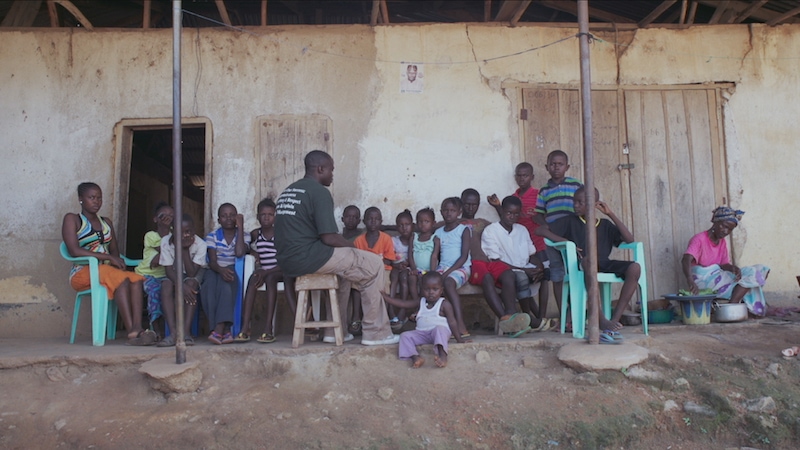
In Foya, Liberia, Joseph Gbembo lost 17 family members to Ebola. Now he helps care for 16 remaining nieces and nephews. From Samaritan’s Purse, FACING DARKNESS releases March 30, 2017. (Photo credit: Samaritan’s Purse)
We’re also shown more about the local culture and understand why it spreads so easily and is difficult to control. Culturally speaking, caring for the sick and the dead in Liberia is a natural part of life. But that exposure increases the risk of contagion tremendously. Trying to educate the locals on how to prevent the spread of the disease proved difficult as well as many Liberians either didn’t believe the virus was real or simply distrusted the white man bringing the message.
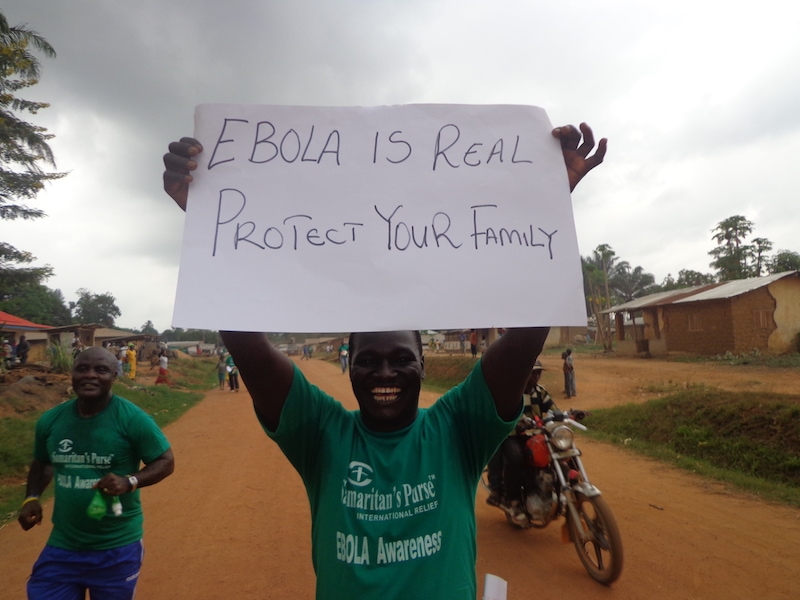
During the Ebola epidemic, radio ads and other awareness campaigns reach more than 1.5 million people. From Samaritan’s Purse, FACING DARKNESS releases March 30, 2017. (Photo credit: Samaritan’s Purse)
It was amidst this environment that Samaritan’s Purse stepped up, along with Doctors Without Borders, to aid in the care of those infected with Ebola virus. That basically meant donning a HAZMAT suit and providing comfort and care for those who must remain isolated while dying a horrible death.
To know that there are people that understand this challenge and willingly accept this call to aid is remarkable in itself. And seeing the work that they do reminds me that the world is so much bigger than myself. And then when you see these people taking every precaution to protect their own health so that they may continue to serve and it fails, you feel the devastation that is felt by the entire team.
Yes, Dr. Kent Brantly and Nancy Writebol received experimental treatments that had never been tested on humans. Yes, they both survived. But in becoming those human guinea pigs, they were doing more than taking advantage of their privileged positions. They were jumpstarting research that could lead to a major breakthrough in the treatment and prevention of Ebola.

Nancy Writebol, shown with husband, David, is one of two Americans to contract and survive the most recent Ebola outbreak in Liberia. From Samaritan’s Purse, FACING DARKNESS releases March 30, 2017. (Photo credit: Samaritan’s Purse)
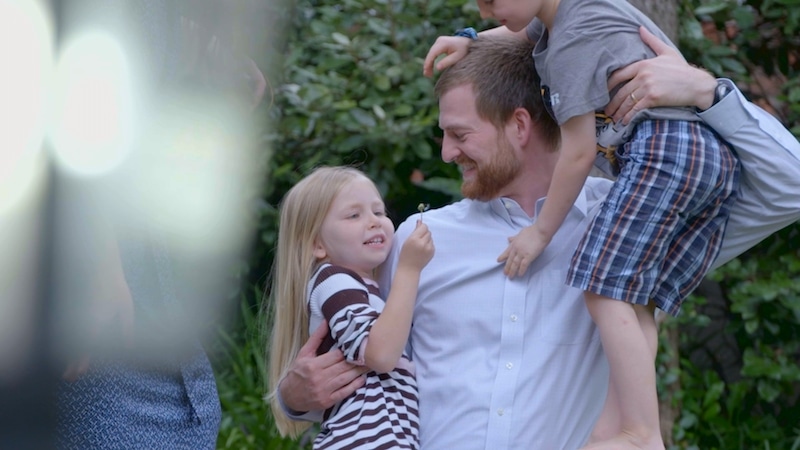
In Ft. Worth, Kent Brantly plays with his children in a scene from the film. From Samaritan’s Purse, FACING DARKNESS releases March 30, 2017. (Photo credit: Samaritan’s Purse)
Facing Darkness is an inspiring documentary following the brave people who selflessly care for those that no one else wanted to help and if nothing else, it’s an incredible reminder of humanity.
I encourage to you spend an evening following this amazing story from start to finish.
Rating: Not rated
Recommended for: Adults and kids 13 and up; be prepared for graphic descriptions and flashes of sick and dead bodies
Discussion points: So many discussion points from global health to relief organizations to politics to the human spirit; this is a film that could even inspire the direction of someone’s life.
Rating: 5 out of 5 stars; very well produced, an excellent documentary with no hidden agenda

